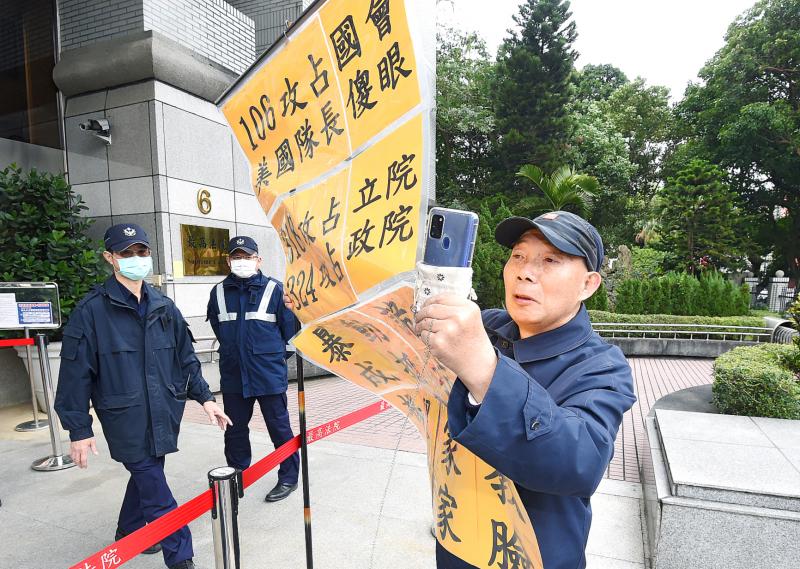The Supreme Court yesterday ordered the retrial of eight Sunflower movement figures sentenced last year to two to four years in prison over their roles in the occupation of the Executive Yuan in 2014.
In remanding the case to the High Court, the Supreme Court said that the defendants were exercising “civil disobedience” and should receive more lenient sentences.
The High Court in April last year sentenced the Sunflower movement figures, including Dennis Wei (魏揚), for inciting others to commit crimes related to the occupation of the Executive Yuan complex during the 23-day protest.

Photo: Liao Chen-huei, Taipei Times
The defendants appealed the case to the Supreme Court.
In its ruling yesterday, the court revoked the guilty verdicts and ordered a retrial, based on the argument that the defendants were exercising their “right of resistance” or “civil disobedience” as part of their right to freedom of expression.
The “right of resistance” is used to protect and restore a democratic constitutional order, and is legal and legitimate under the Constitution, the court said.
Although the Constitution does not explicitly stipulate the “right to resistance,” it should still be recognized based on the constitutional principles under popular sovereignty, it said.
Therefore, behavior that exercises the “right of resistance” can be used to defeat or mitigate the legal consequences of what might otherwise be unlawful conduct, it said.
The court can apply these rules related to behavior under extenuating circumstances, such as cases of self-defense, to reduce a defendant’s sentence or overrule any unlawful conduct, it added.
The court ruling also said that the High Court did not look into the reason for the defendants’ behavior, nor did it thoroughly investigate and explain if that behavior constituted the crime of inciting others to commit crimes.
The Sunflower movement was a protest against the then-Chinese Nationalist Party (KMT) government’s handling of a trade in services agreement with China. It began after then-KMT legislator Chang Ching-chung (張慶忠) rushed through the agreement without debate on March 17, 2014.
During almost 23 days of protests from March 18 to April 10, hundreds of people broke into the Legislative Yuan, while thousands demonstrated outside the complex.
One group, which included the eight defendants, attempted to occupy the nearby Executive Yuan on March 23, but were forcibly removed by police during the early hours of March 24.
The Taipei District Prosecutors’ Office indicted them in 2015 for inciting others to commit crimes, obstructing officials in carrying out their duties and damaging government property.
During the first trial, the Taipei District Court found them all not guilty. Prosecutors later appealed to the High Court, which overturned the initial verdicts.

The manufacture of the remaining 28 M1A2T Abrams tanks Taiwan purchased from the US has recently been completed, and they are expected to be delivered within the next one to two months, a source said yesterday. The Ministry of National Defense is arranging cargo ships to transport the tanks to Taiwan as soon as possible, said the source, who is familiar with the matter. The estimated arrival time ranges from late this month to early next month, the source said. The 28 Abrams tanks make up the third and final batch of a total of 108 tanks, valued at about NT$40.5 billion

Two Taiwanese prosecutors were questioned by Chinese security personnel at their hotel during a trip to China’s Henan Province this month, the Mainland Affairs Council (MAC) said yesterday. The officers had personal information on the prosecutors, including “when they were assigned to their posts, their work locations and job titles,” MAC Deputy Minister and spokesman Liang Wen-chieh (梁文傑) said. On top of asking about their agencies and positions, the officers also questioned the prosecutors about the Cross-Strait Joint Crime-Fighting and Judicial Mutual Assistance Agreement, a pact that serves as the framework for Taiwan-China cooperation on combating crime and providing judicial assistance, Liang

A group from the Taiwanese Designers in Australia association yesterday represented Taiwan at the Midsumma Pride March in Melbourne. The march, held in the St. Kilda suburb, is the city’s largest LGBTQIA+ parade and the flagship event of the annual Midsumma Festival. It attracted more than 45,000 spectators who supported the 400 groups and 10,000 marchers that participated this year, the association said. Taiwanese Designers said they organized a team to march for Taiwan this year, joining politicians, government agencies, professionals and community organizations in showing support for LGBTQIA+ people and diverse communities. As the first country in Asia to legalize same-sex

MOTIVES QUESTIONED The PLA considers Xi’s policies toward Taiwan to be driven by personal considerations rather than military assessment, the Epoch Times reports Chinese President Xi Jinping’s (習近平) latest purge of the Chinese People’s Liberation Army (PLA) leadership might have been prompted by the military’s opposition to plans of invading Taiwan, the Epoch Times said. The Chinese military opposes waging war against Taiwan by a large consensus, putting it at odds with Xi’s vision, the Falun Gong-affiliated daily said in a report on Thursday, citing anonymous sources with insight into the PLA’s inner workings. The opposition is not the opinion of a few generals, but a widely shared view among the PLA cadre, the Epoch Times cited them as saying. “Chinese forces know full well that